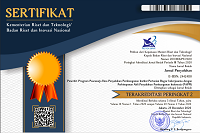Pemberdayaan dalam Meningkatkan Kesejahteraan Petani Bawang Merah di Kecamatan Medan Marelan
Abstract
Welfare is the hope of everyone, including farmers, that various efforts are made so that the income and welfare of farmers can increase. One of them is through empowerment so that farmers can produce independence both economically, managerially, and socially. This study aims to find out how the implementation of the empowerment of shallot farmers in improving welfare and identify supporting and inhibiting factors in empowering shallot farmers in Medan Marelan District, Medan City. This study uses a qualitative approach. Data collection techniques are carried out through observation, interviews, and documentation. Data validation techniques used in this study are source triangulation and method triangulation. The data analysis technique used in this study is qualitative data analysis techniques, namely data collection, data reduction, data presentation, and ng concluding/verification. The results of the study show that the forms of empowerment carried out by shallot farmers in improving welfare are carried out through regular meetings, self-help, and mutual cooperation, capital, provision of shallot production facilities, as well as the support and role of stakeholders. Supporting factors for increasing the welfare of farmers are the provision of production facilities by the government, vegetable commodities as support, training, and comparative studies. While the inhibiting factors are reduced land area and not yet optimal farmer institutions.
Downloads
References
Ab, S., & Hasrida. (2019). Pemberdayaan Petani Bawang Merah Terhadap Kesejahteraan Keluarga Kolai Kabupaten Enrekang. Jurnal Mimbar Sosial, 2, 1–12.
Arifin, Z. (2012). Penelitian pendidikan : Metode dan paradigma baru. Remaja Rosdakarya.
Badan Pusat Statistik. (2020). Data dan Informasi Kemiskinan Provinsi. www.bps.go.id
Badan Pusat Statistik. (2021). Kota Medan Dalam Angka.
Billah, Z. I., & Mulyani, S. (2019). Model Pemberdayaan Ekonomi Petani Potensi Desa (Studi Kelompok Usaha Tani di Dusun Kucur Desa Sumberejo Purwosari Kabupaten Pasuruan). Iqtishodiyah, 5(1), 61–85.
Hariyani, E. (2020). Tingkat Perubahan Sikap Masyarakat Terhadap Budaya Gotong Royong di Kampung Sawit Permai.
Kamaludin, K., & Wahyuningsih, S. (2022). Strategic Plan for Survival of Shallot Farmers’ Business Capital Management. Jurnal Economia, 18(1), 16–27. https://doi.org/10.21831/economia.v18i1.37806
Maulana, K. (2019). Peran Kelompok Tani Terhadap Kondisi Perekonomian Petani. Jurnal Pendidikan Teknologi Pertanian, 5(2), 67. https://doi.org/10.26858/jptp.v5i2.9671
Miles, M. B., Huberman, A. M., Rohidi, T. R., & Mulyarto. (1992). Analisis data kualitatif : buku sumber tentang metode metode baru. Penerbit Universitas Indonesia (UI -Press).
Mulyaqin, T., Astuti, Y., & Haryani, D. (2016). Faktor Yang Mempengaruhi Petani Padi Dalam Pemanfaatan Sumber Permodalan : Studi Kasus Di Kabupaten Serang Provinsi Banten. Seminar Nasional BPTP, 2(1), 2016. https://doi.org/10.13140/RG.2.2.15776.17921
Saptana, Susilowati, G., Ar-Rozi, A. M., & Sativa, M. (2021). Farmers’ institutional transformation in the shallot area of Malang District, Indonesia. IOP Conference Series: Earth and Environmental Science, 892(1). https://doi.org/10.1088/1755-1315/892/1/012007
Siwu, A. A. R., Mandei, J. R., & Ruauw, E. . . (2019). Dampak Program Bantuan Sarana Produksi Pertanian Terhadap Pendapatan Petani Cabai Di Desa Kauneran Kecamatan Sonder. Agri-Sosioekonomi, 14(3), 347. https://doi.org/10.35791/agrsosek.14.3.2018.22653
Sugiyono. (2007). Metode Penelitian Kuantitatif, Kualitatif, dan R&D.
Sugiyono. (2019). Metode Penelitian Pendidikan (Kuantitatif, Kualitatif, Kombinasi, R & D dan Penelitian Pendidikan). Alfabeta.
Trimo, L., Hidayat, S., & Budiman, M. A. (2020). Upaya Peningkatan Pendapatan Keluarga Tani Teh Rakyat melalui Pemberdayaan Wanita Pedesaan di Kecamatan Cisurupan Kabupaten Garut. 5(1), 193–204.
Undang-Undang Republik Indonesia No. 19. (2013). Tentang Perlindungan dan Pemberdayaan Petani.
Authors who publish with this journal agree to the following terms:
- Authors retain copyright and grant the journal right of first publication with the work simultaneously licensed under a

This work is licensed under a Creative Commons Attribution 4.0 International License that allows others to share the work with an acknowledgement of the work's authorship and initial publication in this journal. - Authors are able to enter into separate, additional contractual arrangements for the non-exclusive distribution of the journal's published version of the work (e.g., post it to an institutional repository or publish it in a book), with an acknowledgement of its initial publication in this journal.
- Authors are permitted and encouraged to post their work online (e.g., in institutional repositories or on their website) prior to and during the submission process, as it can lead to productive exchanges, as well as earlier and greater citation of published work (See The Effect of Open Access).















